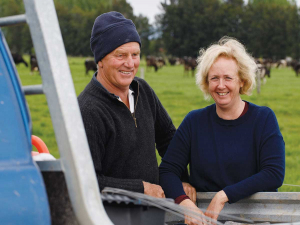DairyNZ Calls for Changes to Government’s Proposed Resource Management Act Reform
DairyNZ says the Government’s proposed Resource Management Act reform needs further work to ensure it delivers on its intent.
 Corrie and Donna Smit are applying lessons from previous industry peaks and troughs at a time when many farmers are struggling to maintain profitability.
Corrie and Donna Smit are applying lessons from previous industry peaks and troughs at a time when many farmers are struggling to maintain profitability.
After 30 years’ dairying on the same Bay of Plenty farm, Donna and Corrie Smit have learnt lessons on weathering everything from devastating floods to milk price fluctuations.
As dairy farm costs climb ever upward, the Smits are applying their lessons from previous peaks and troughs at a time when many farmers are struggling to maintain profitability.
Farmers involved in DairyNZ’s Budget Case Study project, which includes the Smits, have experienced an average increase in operating expense over the past 2 years of an eye watering 23%, up from $4.34/kgMS to $5.35/kgMS*.
That $1.01/kgMS jump in costs has been covered by the rise in gross farm revenue of $1.26, most of this being needed to pay for the higher interest rates and living expenses.
Donna says she and Corrie have stuck to a “keep it simple” approach throughout their farming career.
At its core, and playing a key part in holding costs down, is the mantra to “grow more grass and turn it into milk”, capitalising on what will always be the lowest-cost feed source at hand.
That ability to maximise the cheapest feed possible has been aided by committing to the highest quality farm they could.
The free-draining productive flats around Edgecumbe were not the cheapest when they purchased their farm, but they’ve proven the most capable of generating quality grass.
Today, the property they’ve added to 14 times is “tidy but not highly automated”, reflecting their simple approach, she says.
Growing plenty of grass has enabled them to hold their farm working expenses (note, this excludes unpaid family labour and depreciation, which are operating expenses) at around $2.90/kgMS over the past few years, pushed up to $3.50/kgMS for the past year.
The usual suspects also appear on their list of increased costs, namely electricity, fertiliser, fuel, rates and supplement.
Their ability to adjust to rising farm costs stems from their second principle: to keep costs as variable as possible, rather than be lumbered with ongoing, fixed costs.
The Smits also work hard to minimise wasteful hidden costs throughout the farm operation. This demands a quick response to problems, whether it’s a leaky trough or lame cows, whereas leaving those problems results in a far greater expense later.
The Smits have also worked hard to build strong relationships with the businesses and suppliers they deal with, often for decades.
“In return, we do expect quality, service and cost effectiveness,” says Donna.
These open, well-founded relationships enable them to have honest conversations about price rises.
Future costs include emissions.
Donna and Corrie are tackling the future challenge of greenhouse gas emissions pricing in a manner that also fits with their low-cost, simple approach.
“We’re focusing on breeding better, lighter cows that deliver more kilograms of milksolids per kg of bodyweight, by moving from a Friesian herd to a cross-bred herd.
With no relief from cost rises appearing on the horizon, the Edgecumbe farm may be well positioned for a major shift in operations in coming years.
Their ability to move cows that are suited or not suited to such a system between the farms makes it an appealing option. Labour savings, and an interesting new way to continue dairying, are also attractive.
Donna sees robotic milking becoming a popular option, particularly on smaller North Island dairies, as aging owners look to stay engaged with farming but in a less physical way.
“We’re not quite there yet in terms of the capital cost, but I think it will be getting closer with the next generation of milking robots.”
Budou are being picked now in Bridge Pā, the most intense and exciting time of the year for the Greencollar team – and the harvest of the finest eating grapes is weeks earlier than expected.
The Real Estate Institute of New Zealand (REINZ) has released its latest rural property report, providing a detailed view of New Zealand’s rural real estate market for the 12 months ending December 2025.
Rural retailer Farmlands has released it's latest round of half-year results, labeling it as evidence that its five-year strategy is delivering on financial performance and better value for members.
OPINION: "We are back to where we were a year ago," according to a leading banking analyst in the UK, referring to US president Donald Trump's latest imposition of a global 10% tariff on all exports into the US.
DairyNZ says the Government’s proposed Resource Management Act reform needs further work to ensure it delivers on its intent.
Overseas Trade Minister Todd McClay says he's working constructively with the Labour Party in the hope they will endorse the free trade agreement (FTA) with India when the agreement comes before Parliament for ratification.